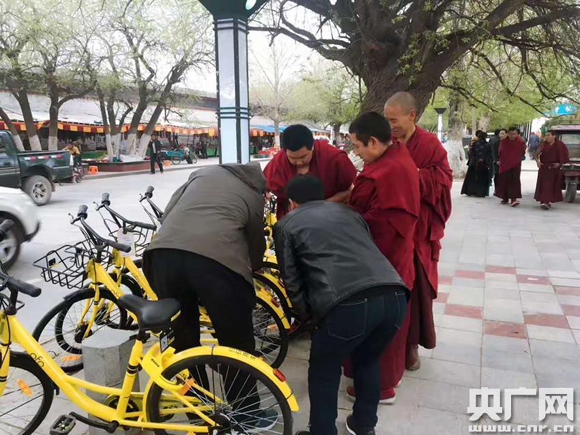Hungarian version of Chinese president’s book on governance launched in Budapest
Liu Qibao (L), member of the Political Bureau of the Central Committee of the Communist Party of China (CPC) and head of the Publicity Department of the CPC Central Committee, and Matrai Marta, executive vice chairman of the Hungarian National Assembly, attend the release ceremony of the Hungarian version of Chinese President Xi Jinping’s book “Xi Jinping: the Governance of China” in Budapest, Hungary, on April 24, 2017. (Xinhua/Ye Pingfan)
Shared bikes climb to the ‘roof of the world’
China’s bike-sharing fever has spread to Tibet, with 500 shared two-wheelers appearing on the plateau Thursday.
|
|
|
People try to ride the yellow Ofo bikes placed in the street in Xigaze, Tibet Autonomous Region. [Photo/www.cnr.cn] |
The fleets of bright yellow Ofo bikes have been placed in 22 spots in Xigaze, the region’s second largest city, said Lyu Shuang, the company’s regional manager.
“We hope shared bikes become low-carbon, cheap transport for locals and tourists alike in Tibet,” Lyu said, adding that the company’s next stop would be Lhasa, capital of Tibet Autonomous Region.
The bike-sharing business, which took off in big Chinese cities last year, allows riders to hire bikes for as little as one yuan (about 15 U.S. cents) per hour via a mobile app and drop them off anywhere for the next user.
The bikes on the busy streets of Xigaze have attracted curious users. “It’s quite cheap, and really suitable for a short ride,” said citizen Cering, who with his friends rented a bike just for fun.
Backed by two-digit economic growth for over 20 years, car sales in Tibet have been booming. The underpopulated region now has 300,000 vehicles, with half of them in Lhasa.
However, the four-wheelers have led to traffic congestion and parking problems in downtown Lhasa.
60% dissatisfied with Taiwan’s ruling DPP Party: poll
Almost 60 percent of people in Taiwan are unhappy with the performance of the current administration led by the Democratic Progressive Party (DPP), a poll released by the Taiwanese Public Opinion Foundation showed Monday.
The poll, which was conducted by telephone between April 17 and 18 among 1,082 adults age 20 and older, showed that 59.1 percent of respondents were dissatisfied with the DPP’s performance, in comparison to the 35 percent who were satisfied.
Disapproval toward the DPP administration can be seen in people of different ages, occupations and regions across the island, said You Ying-lung, chairman of the foundation.
“For example, residents of all occupations, except farmers, expressed widespread criticism toward the DDP,” You noted.
The survey also showed about 46 percent of the public expressed dissatisfaction with Taiwan leader Tsai Ing-wen’s performance, 11 months after she took office on May 20 last year. The rate is the second-highest in the foundations’s monthly poll.
Serial killer in N. China prosecuted on 4 criminal charges
Suspected serial killer Gao Chengyong, detained in Baiyin, Gansu province last year, was prosecuted on four crimes, including intentional killing, raping, robbery and insulting the corpse, on Monday, April 24, 2017.
![Police detain Gao Chengyong in Baiyin, Gansu Province, on Aug. 26, 2016. [File photo] Police detain Gao Chengyong in Baiyin, Gansu Province, on Aug. 26, 2016. [File photo]](http://images.china.cn/attachement/jpg/site1007/20170425/001fd04cf03a1a69262a01.jpg) |
|
Police detain Gao Chengyong in Baiyin, Gansu Province, on Aug. 26, 2016. [File photo] |
Gao Chengyong, 53 years old, was accused of the rape and murders of 11 victims, including an 8-year-old girl, in northern China.
Gao Chengyong was caught in a grocery store by police in Baiyin on August 26, 2016. Nine murders linked to the suspect occurred in the city in Gansu province.
The Ministry of Public Security has said the suspect confessed to 11 murders in Gansu and Inner Mongolia autonomous region between 1988 and 2002.
Gao targeted young women dressed in red and would follow them home, where he would rape and kill them, often by cutting their throats.
The killer also mutilated the victims’ bodies, which resulted in the Chinese media dubbing him China’s Jack the Ripper.

